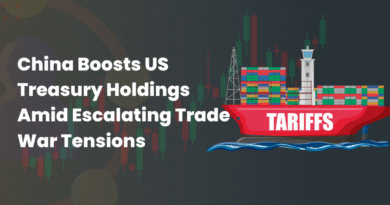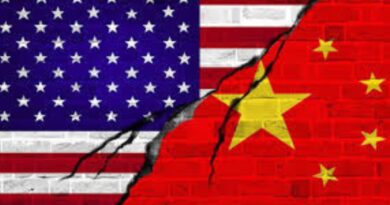Warren Buffett Warns Trump’s Trade Policies Risk Nuclear Confrontation
Warren Buffett Raises Concerns Over Trump’s Trade Strategy
When Warren Buffett speaks, people tend to listen. Known as the “Oracle of Omaha,” Buffett has built a reputation for smart investing and clear thinking. So, when he warns about the risks tied to U.S. trade policies, it’s worth paying attention.
Recently, Buffett shared his thoughts on former President Donald Trump’s trade approach—and the message was striking. He believes that aggressive trade tactics could have serious, even dangerous results.
Why Buffett’s Opinion Matters
Buffett isn’t just another name in the news. He runs Berkshire Hathaway, a massive holding company worth billions. Over the decades, he’s built wealth by understanding how markets work and how businesses thrive.
He’s not known for making radical political comments. He usually sticks to numbers, companies, and long-term trends. That’s why his recent comments about how trade decisions could lead to global conflict caught people off-guard.
Buffett warns that overusing tariffs and other trade threats could escalate tensions between countries. In the worst-case scenario, he says, this kind of behavior could even lead to something as unthinkable as nuclear confrontation.
What Are Tariffs, and Why Do They Matter?
Let’s take a step back. What exactly are tariffs?
Tariffs are taxes placed on imported goods. For example, if the U.S. puts a tariff on steel from China, buyers in the U.S. have to pay more to get that steel. The goal is usually to protect U.S. industries or to pressure foreign countries during trade talks.
Trump made heavy use of tariffs during his time in office. He wanted to bring more manufacturing back to the U.S. and reduce reliance on foreign goods. On the surface, that sounds like a good plan—support American workers and control supply chains, right?
But Buffett says there’s more going on here.
The Risk of Overplaying the Trade Card
Buffett believes that using trade as a weapon can quickly backfire. If one country raises tariffs, the other side often responds with their own. It becomes a tit-for-tat game that can spiral out of control.
He compares this back-and-forth to what happens in wars. Only instead of bullets being fired, it’s penalties, tariffs, and restrictions.
Here are a few key points Buffett makes:
- Countries don’t like being pushed around. If a nation feels attacked through trade, they’re likely to push back hard.
- When tensions rise, communication breaks down. This creates more confusion and less cooperation.
- Escalation brings dangers beyond dollars and cents. In extreme cases, trade disputes could weaken diplomatic ties—and that’s where serious global risks begin.
Could Trade Really Lead to War?
That might sound far-fetched—but history tells us otherwise. Trade conflicts have played roles in global tensions before.
Think about how alliances shift when countries are pushed into economic hardship. If multiple powerful nations feel backed into a corner by aggressive trade tactics, things can escalate.
Ask yourself: If your country faced constant trade pressure, how would your leaders react?
Buffett believes that mixing economic punishment with political posturing can create an unstable mix. If countries stop trusting each other, they might stop talking altogether. And when that happens, even small missteps can turn into major problems.
The Nuclear Risk
That’s where Buffett’s warning really takes shape. If economic fights destroy ties between countries with nuclear weapons, what’s the backup plan?
Buffett isn’t predicting a war. But he’s saying trade tactics can be a spark in the wrong environment. And in today’s world—where powerful countries have access to deadly technology—that’s a risk we can’t afford to ignore.
Trump’s Trade Strategy and What It Costs
During his term, Trump focused on balancing trade deficits, especially with China. He believed the U.S. was being taken advantage of in global trade.
Major steps in his approach included:
- Adding tariffs on hundreds of billions of dollars in Chinese goods
- Exiting international trade deals he felt were bad for the U.S.
- Threatening harsh penalties if countries didn’t agree to new terms
Some supporters say this tough style helped get better deals. But others, like Buffett, worry the long-term damage may be worse than any short-term gain.
Higher tariffs mean higher costs for businesses and consumers. Farmers faced retaliation. Small companies paid more for supplies. Trade slowed.
But even beyond that, Buffett fears that using hardline tactics creates a dangerous pattern. One where threats replace trust—and that creates a world more likely to fall into conflict than cooperation.
Can Trade Be Strong Without Aggression?
Buffett argues for cooperation, not confrontation. According to him, strong economies are built when countries work together, not when they try to one-up each other.
He believes in open markets, fair rules, and long-term thinking.
Let’s ask this: Can nations build strength without building walls?
It’s a tough question. Every country wants to protect its own workers and businesses. But there are ways to promote what’s fair without triggering wars—economic or worse.
Buffett’s Long-Term View
Throughout his life, Buffett has stayed focused on one thing: long-term value. He doesn’t make decisions based on next week’s headlines. He looks decades ahead.
So when he says that aggressive trade tactics might do more harm than good, he’s not just talking politics. He’s warning of deep cracks in global relationships.
To him, it’s simple. Trade is more than business—it’s a link between nations. If that link breaks, the consequences could be severe.
What Can We Learn From This?
Not everyone has the global reach of a U.S. president, but there’s still something anyone can take from Buffett’s warning.
Whether you’re running a business or following world affairs, consider these ideas:
- Quick wins can cause long-term setbacks. Always think about tomorrow, not just today.
- When trust disappears, danger grows. In business and politics, relationships are everything.
- Words and actions matter. Even economic decisions can shape international peace—or conflict.
Final Thoughts: The Bigger Picture
Buffett’s message is clear. Trade policies impact more than just jobs or prices. They shape global relations, influence diplomacy, and—if handled poorly—can trigger much larger problems.
You might not agree with everything he says. But when someone with Buffett’s track record speaks about the risks of global instability, it’s worth taking a moment to reflect.
Trade can be a bridge—or a weapon. Which one it becomes depends on the choices leaders make. And as ordinary people, we all have a stake in ensuring those bridges stay intact.









